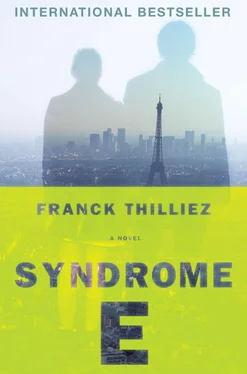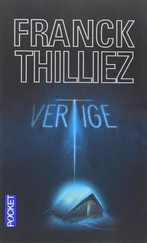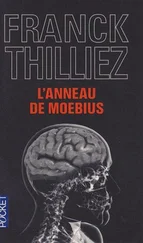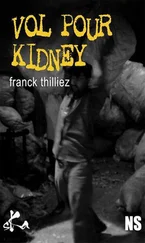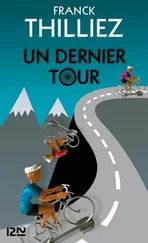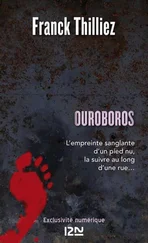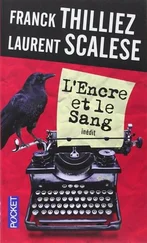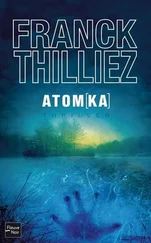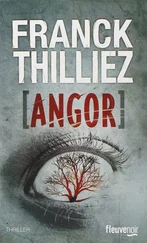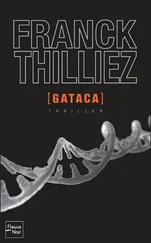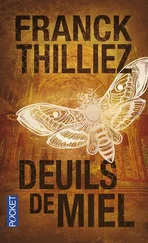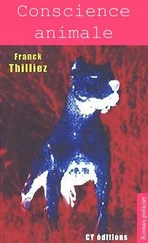A window shattered into pieces behind her. Lucie jumped in fright.
The flames began to invade the house, raging farther inward; the wood began to twist. The cop’s mind grew cloudy, her eyes were stinging, the heat was growing unbearable. She dug her nails into her thighs. Just hold on.
One minute… Two minutes…
Just then, a silhouette appeared in the swirls of smoke next to the bay window. The shadow entered cautiously, pistol facing front. A gray head glanced around the room. Lucie suddenly jumped up with a shout and emptied her chamber, firing blindly.
The shape collapsed.
Lucie held her breath and rushed across the smoke-filled room. As she stepped over the body, she briefly recognized the face of her neighbor from the plane. On his feet were combat boots.
She threw herself outside, ran about a dozen yards, and collapsed on the ground.
She coughed for a long time before finally sucking in a huge gulp of air.
When she turned around, the house was nothing but a giant ball of fire.
Lucie had become a nameless person, without her bag, without papers, without ID.
And she had killed a man in a country that wasn’t her own.
The blue halo of the police cruisers’ revolving lights mixed with those of the two fire trucks parked next to the cabin. The firefighters had arrived with dizzying speed, and their powerful hoses had managed to contain the blaze before it could spread to the surrounding woods. But Philip Rotenberg’s home was no more than a heap of rubble and smoke.
The tense silhouettes of the Royal Canadian Mounted Police moved cautiously around the two charred bodies, taking numerous photos and fingerprints. All sorts of uniforms were present: red jackets, black-and-yellow trousers, felt hats, and Strathcona boots for the Mounties; white lab coats for the CSI teams; black slickers and canvas pants for the firefighters. The emergency teams worked together perfectly, giving the impression of a synchronized ballet.
Lucie was handcuffed. No brutality or animosity, just a respect for procedure. Her papers, notes, and backpack had vanished in the fire, and she had killed a man with multiple gunshots. The weapon found at her feet had just been taken away in a transparent baggie for fingerprint and ballistic analysis.
Lucie had been placed under arrest at 11:05 p.m. Quebec time by a detective named Pierre Monette, who brought her to the precinct at Trois-Rivières.
In the ultramodern quarters of the local police, they emptied her pockets—the key Rotenberg had entrusted to her ended up at the bottom of another baggie—and two men, not exactly altar-boy types, interrogated her without giving her time to catch her breath. Lucie explained the situation as best she could. She told them about the murders in France, the experiments in the 1950s, her findings at the archives, and her fake kidnapping by Philip Rotenberg. In a calm, self-assured voice, she invited her interrogators, who were exchanging skeptical glances, to get in touch with Quebec Sûreté and the French police for further information about the case. She scrupulously jotted down all the contact information and telephone numbers she could remember.
Her letter rogatory would no doubt save her neck, even though, in such situations, foreign police didn’t have the right to intervene directly, especially when it came to using a firearm.
Her cooperative attitude and clear explanations did not save her from spending the night in a cell. Once more, Lucie did not protest. She knew how investigations worked, and what a complicated situation the Canadian police had to deal with. Two charred corpses found in the depths of a forest, a Frenchwoman with no ID, some wild tale about the CIA and secret services—this was no small matter. Verifying her statements would take time.
The important thing was that she was alive. She’d see her daughters again.
Alone in the small rectangular room, she collapsed onto the bench, her nerves shot. The man she had killed that evening was only the second in her career. To snuff out a life, no matter whose, always leaves a deep, black fissure in your soul. Something indelible that can haunt you for a long time.
She thought about Rotenberg, who had just been about to reveal the whole truth. As with the film restorer, she had handed him to his killers on a platter. Hidden in the deepest reaches of the forest, the man had paid the price for her negligence.
Those bastards had used her once again, and Lucie hated herself for it.
Detective Monette came by at regular intervals to see how she was doing, to bring her water or coffee; he even offered her a cigarette, which she declined. Later that night, he told her that everything was coming along smoothly and that she’d probably be out before noon.
The hours that followed stretched interminably. No more visits, no one to talk with. Just the leaden morning sun assaulting the northern sky through the Plexiglas windows of the sinister gray cell. Lucie thought incessantly of her girls. Last night, she had almost bought it. What would have become of her daughters without her? Another two orphans in the world. Lucie sighed deeply. As soon as this business was over, she was going to take some serious time to think about her future. About the future of all three of them…
At 10:10 that morning, a silhouette appeared in the frame of the peephole.
Lucie would have recognized it anywhere.
Franck Sharko.
When Detective Monette unlocked the door, Lucie rushed out and, without thinking, threw herself into the arms of the big cop. The inspector hesitated for a fraction of a second, then clamped his two large hands against her back.
“You’re going to make my old ticker give out if you keep this up. Is it always like this with you?”
Lucie’s eyes clouded up. She leaned back, smiling sadly.
“Let’s say these are special circumstances. Hadn’t you noticed?”
For a few seconds, Lucie forgot the dark hours she’d just been through, reassured by Sharko’s solid presence. He nodded his chin toward the bars, with a becoming smile.
“I’ll be back in a moment, just have to finish up the paperwork. Think you can hang out a bit longer?”
“I’d like to make a phone call first. I want to call my girls. Just to hear their voices.”
“In a moment, Henebelle, in a moment.”
Lucie went back and sat on her bench.
Once alone, she let out a long breath and put her hand to her chest.
Lucie returned, holding Sharko’s cell phone. She sat at the table and handed it back to him. On the road from Trois-Rivières to Montreal, they had stopped at a Kentucky Fried Chicken.
“So?” asked the inspector.
“They’re both fine. Juliette doesn’t have any trouble eating anymore and is staying with her grandmother. She’s feeling much better, thank God. And as for Clara, I could only reach the counselors at her camp—the kids are out at a campfire. I forgot it’s already dinnertime over there!”
During the drive, Lucie had time to relate everything that had happened since her arrival in Canada. The Duplessis Orphans, Sanders’s treatments, the CIA’s involvement in experiments on human beings starting in the fifties. Sharko had swallowed, storing away the information without saying a word.
For now, the inspector was hungrily munching on his fried chicken leg, while Lucie nibbled at her coleslaw and sucked down great gulps of Coca-Cola, which helped settle her stomach.
“The sniper at the cabin wasn’t trying to kill me, I’m certain of it. He wanted to smoke me out and take me alive. There was something else.”
Sharko stopped eating. He put down his chicken, wiped his hands, and looked at Lucie.
Читать дальше
